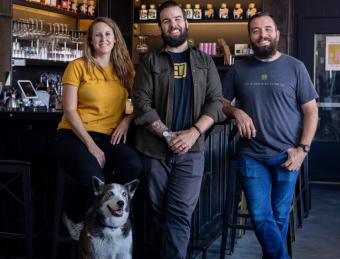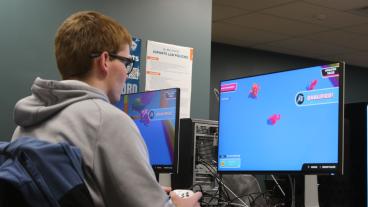The Art of Distilling: How Mines alums brought their engineering skills to the world of whiskey
Kraig '10 and Kameron Weaver '12, along with Kraig's wife Michelle, founded The Block, a distillery in Denver's RiNo Art District that creates a range of whiskeys and spirits.

Walking into The Block Distilling Co., a distillery in Denver’s RiNo Art District, you’re immediately greeted by a blend of craftsmanship and creativity. Behind the bar, neatly aligned rectangular bottles showcase the distillery’s range of whiskeys and spirits while vibrant street art, a remnant of the gallery that once occupied the building, decorates the walls.
Founded by brothers Kraig ’10 and Kameron Weaver ’12, along with Kraig’s wife, Michelle, The Block is more than a small business—it’s a culmination of passion, engineering know-how and a creative vision.
An engineer’s mindset
Kraig and Kameron didn’t just stumble into the distilling world—they engineered their way into it. Their dream to create whiskeys and other spirits took root before they graduated from Mines. Both had a passion for home brewing, and while the craft beer scene was surging at the time, the brothers were more interested in the challenge of creating whiskey and cocktails.
Although Kraig and Kameron’s degrees are in petroleum engineering and computer science respectively, their time at Mines equipped them with the skills to think critically and adapt quickly—skills that became essential when launching The Block. From mastering the intricacies of distillation chemistry to navigating the hurdles of business ownership, they relied on a problem-solving mindset to bring their vision to life.
“I like to joke that a degree in engineering is really just a degree in figuring out problems. I think that holds true in this setting,” Kraig said. “And I think Mines and the structure of an engineering degree really sets you up for that.”
Their engineering background continues to be a cornerstone of their approach. In fact, Kameron, with the help of fellow Mines alum Taylor Angle ’12, even built some of the distillery’s automation equipment. They designed a control panel to run critical components of the distillation process, such as cooling and steam valves, agitators and temperature sensors.
“We had to figure out how different microcontrollers were able to talk to each other and go back into more of an electrical engineering side,” Kameron explained.
Ultimately, the Weavers make sure they have a hand in every part of the distillery and understand how the whole system works so they are able to diagnose problems and make sure everything runs safely and efficiently.
The engineering process applies to creating flavor profiles as well. With primarily grain-based products, The Block sources 70 percent of its grain from a family farm owned by another Mines alum, Doug Low ’10, with additional grain sourced from
around Colorado.
“We get to have a say in the varietals of grain being grown and how those are going to affect the flavor of our products, as well as farming practices and storage methods,” Kraig said. “They are knobs of control and influence that a distillery of our size doesn’t typically have.”
The Block has also dipped into brandy production, which relies on fruit rather than grain, during harvest season in Colorado to create some pear and grape brandies. They have also created Italian-style liqueurs such as an apéritif, amaro and coffee liqueur.
“We’re constantly learning. We’re constantly trying to figure out how we can alter our process or change a small aspect of the end product to make it even better than it is now,” Kameron said.
A Mines collaboration
The Block partnered with Mines to offer a unique product to celebrate the university’s 150th anniversary: a small batch wheat whiskey. Crafted from a blend of red and white wheat with malted barley, the whiskey—aptly named “Helluva Whiskey” in a nod to Mines—made its debut at this year’s Homecoming.
However, the Weavers didn’t want to just create a commemorative whiskey—they wanted to give back to the university. For every bottle sold, $10 goes toward scholarships and creative arts projects on campus—an area Kraig and Kameron both valued during their time at Mines.
Kraig was president of the Creative Arts Club when he was a student, and Kameron was involved in the student arts journal, High Grade. These creative opportunities helped provide balance to the highly technical focus of their classroom experiences.
“Having a way to turn off the engineering mind and think about things in a different way is something that’s invaluable,” Kameron said. “Then you can come back to that engineering mindset with a refreshed approach.”
“With such a heavy engineering focus, it was really those clubs that offered those releases,” Kraig said. “So when we started talking with Mines about doing something collaborative, our immediate thought was doing something that actually helped fund some of those programs and give other students more creative outlets.”
Ultimately, The Block represents more than just a business venture—it’s a testament to the application of engineering principles in a creative and highly technical field. The Weavers continue to apply their Mines education in unexpected ways, proving that engineering isn’t just a degree—it’s a toolkit for solving problems, no matter the industry.




